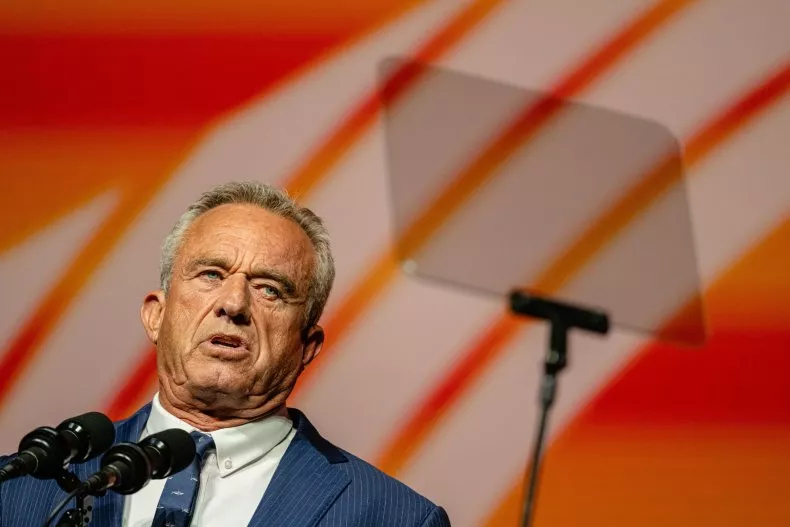Robert F. Kennedy Jr. was blocked from appearing on New York’s presidential ballot in November after a state Supreme Court justice found that the independent candidate falsely stated his address on the petitioning documents required to appear on the state’s ticket.
Albany Supreme Court Justice Christina Ryba ruled on Monday that Kennedy had falsely claimed to be a New York resident on the petition forms, per a report from the Associated Press (AP). Kennedy is expected to appeal the ruling, which stemmed from a lawsuit filed by Clear Choice, a Democratic-aligned political action committee.
The suit claimed that Kennedy’s nominating petition said that he lived in a suburb of Manhattan while he has actually been living in Los Angeles since 2014 with his wife, Cheryl Hines, co-star of iconic HBO sitcom Curb Your Enthusiasm.
The trial lasted less than four days, according to a report from AP. Kennedy maintained while testifying in court that he has lived in New York since 1964. Petitioners argued, however, that the address listed on Kennedy’s nominating petition was the residence of one of his friends—Barbara Moss—and that he lives in California, “along with his three dogs, two ravens, an emu and his personal belongings.”
Kennedy said during trial that he rents a room out of his friend’s house who lives in Katonah, a wealthy suburb roughly 40 miles north of Manhattan. AP reported that Kennedy testified he has only slept in the room once because of his campaign schedule. He added that he always planned to return to New York and that he is registered to vote in the Empire State.
Moss testified that Kennedy pays her $500 a month to rent out a room at her residence, reported AP. The witness added, however, that there was no written lease and that Kennedy’s first payment was not made until after a report by the New York Post in May, which cast doubt on Kennedy’s residency in New York.
Kennedy, who according to FiveThirtyEight holds 4.9 percent of the vote on average across national polling, has also faced lawsuits in North Carolina and New Jersey challenging his candidacy. He recently won the challenges in both states.
Kennedy told reporters after trial on his New York suit wrapped up last week that the outcome of the residency challenge could lead to lawsuits in other states where he listed the same Katonah address.
“Those Americans want to see me on the ballot,” Kennedy said, referring to the voters who signed his petitions, per AP’s report. “They want to have a choice.”
Amaryllis Fox Kennedy, campaign manager for RFK Jr., told Newsweek: “Democracy is about trusting voters to make the best choice for themselves and their families, not weaponizing the courts to restrict voter choice and prevent Americans from supporting the candidate they like best. Over a million voters have signed to put Kennedy on the ballot – the most to do so in American history. If the Democratic Party doesn’t start honoring the democratic process, all the lawfare in the world won’t keep the American people from voting them out of office.”
According to Kennedy’s campaign site, he has completed petitioning to appear on the ballot in nearly all 50 states and the District of Columbia. The states where his petition is still pending include Arizona, Kentucky, Mississippi and Wyoming.
The Democratic National Committee accused Kennedy of being “a deeply troubled, reckless, and dangerous man” following Monday’s ruling.
“He doesn’t think the rules apply to him and he refuses to consider the consequences of his actions,” Matt Corridoni, committee spokesperson, said in a statement obtained by Newsweek.




